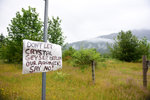






County commissioners will vote Aug. 5 on a moratorium to halt certain permits in the county’s rural areas — a measure designed to pause Crystal Geyser’s controversial proposal to build a water bottling plant in Randle and give officials more time to consider a possible change to zoning regulations.
“The zoning code is going to apply to every rural land in Lewis County, not just one location,” said civil deputy prosecutor Eric Eisenberg in a meeting with commissioners Monday afternoon. “The moratorium actually makes sense, because it gives you time to study the problem in a real way, in a way that’s not just about Crystal Geyser.”
The measure comes following a push by opponents to the plant to disallow large-scale commercial water bottling. A group known as the Lewis County Water Alliance is slated to have a workshop with the Planning Commission in August to further discuss that request, and they’re asking commissioners for a moratorium until the land-use panel weighs in — preventing Crystal Geyser from filing a permit to get “grandfathered” in before changes can be made.
The issue centers around the county’s decision last year to allow standalone food and beverage manufacturing in rural zones — a change designed to accommodate breweries and wineries, but one that opened the door to Crystal Geyser’s proposal for a 100,000 square foot bottling plant. Members of the Planning Commission are considering rolling back that change, while county commissioners are ready to impose a temporary moratorium until the ramifications of the existing rules are clear.
“I like the idea of a moratorium to study it,” said county commissioner Edna Fund. “This will help us so we don’t have any unintended consequences, so everyone has a chance to weigh in. … We need to research this so we get a better idea of what we meant.”
A draft proposal presented by Eisenberg would impose a six-month halt on permits for proposals that extract “water for sale as a principal goal,” as well as any standalone food or beverage proposals that would use more than 5,000 gallons of water a day. Crystal Geyser’s proposed plant would extract hundreds of thousands of gallons each day.
That measure, if passed Monday, will give the Planning Commission time to consider the zoning change requested by opponents to the project. County officials say the decision isn’t just targeted at Crystal Geyser, but noted that the uproar over the plant has illustrated flaws in the code that weren’t intended by changes made last year.
“If it’s the case that you want to explore what was it that we were going for when we changed the zoning code to allow standalone food and beverage manufacturing places, how we wrote it, and how that matches up with what you intended … a moratorium is a sensible way to do it,” Eisenberg said. “It gives the Planning Commission time to study the issue.”
The proposal outlined by Crystal Geyser earlier this year would construct a 100,000 square foot bottling facility along the Cowlitz River, extracting 400 gallons per minute from springs on the Peters Road property. The plan quickly drew fierce backlash, with neighbors, environmentalists and tribal members raising alarm.
Concerns range from the aquifer to water quality in the river to issues with noise and truck traffic. Many have noted that the industrial facility would not fit with the quiet nature of the land, and have wondered how the county’s zoning codes would allow such a development in a rural area.
Backlash escalated after Crystal Geyser chief operating office Page Beykpour accidentally emailed The Chronicle plans to conduct an “astroturf” PR campaign and sue nearby residents to force them to the table — using hard-edged and deceptive tactics to force through a project that has proven deeply unpopular.
On Aug. 27, Water Alliance members will sit down with the Planning Commission to discuss their proposal — which would cap commercial water bottling at “5,000 gallons consumptive use of water per day” — the same amount allowed for homeowners with exempt wells. Backers said they believe the limits they’re advocating for in the moratorium and zoning change would not inhibit production at wineries or breweries.
“(The moratorium) matches with our intent,” said Craig Jasmer, who has emerged as a leader of the Water Alliance group. “We’ve done some studies about how much water breweries and standalone wineries use. … This 5,000 gallons a day is way more than they need.”
Fund and fellow commissioner Gary Stamper quickly gave their support to putting the moratorium on the agenda for a Monday vote. Commissioner Bobby Jackson hesitated, saying he was concerned that the measure could send the wrong message about the county’s desire to promote economic development. He also added that he was concerned about possible liability if Crystal Geyser was to assert that the county was targeting the company specifically.
Stamper said Crystal Geyser represented a special case — a company that has done little outreach in Lewis County and outraged locals with unethical tactics. He said economic leaders are smart enough to realize that the issue doesn’t undercut the county’s pro-business reputation.
“You’re comparing apples to oranges,” he said. “Anyone with a business sense is going to understand that.”
Fund added the county leaders have been careful to examine zoning in a general way, without singling out Crystal Geyser. Ultimately, all three commissioners voted to put the moratorium up for a Monday vote.
“This particular idea, that you have a 100,000 square foot bottling plant not otherwise tied to the use of the land, not otherwise connected to an existing industry in Lewis County — maybe (Jasmer) is right that that’s bad policy,” Eisenberg said. “Maybe we ought not to allow that wherever in any rural land. If you’re going to think about that industrial resource use, we ought to think about where it ought to go more carefully. It has traffic implications, it has implications that we hadn’t considered.”
Crystal Geyser is still in the process of pursuing a withdrawal permit from the water from the Washington State Department of Ecology, but it has not yet filed a special use permit with the county to construct a facility. County officials made clear that the temporary moratorium will not prevent the company from continuing to study a potential plant, and added that they hope Crystal Geyser comes to the table to discuss which zoning regulations would be appropriate long-term.